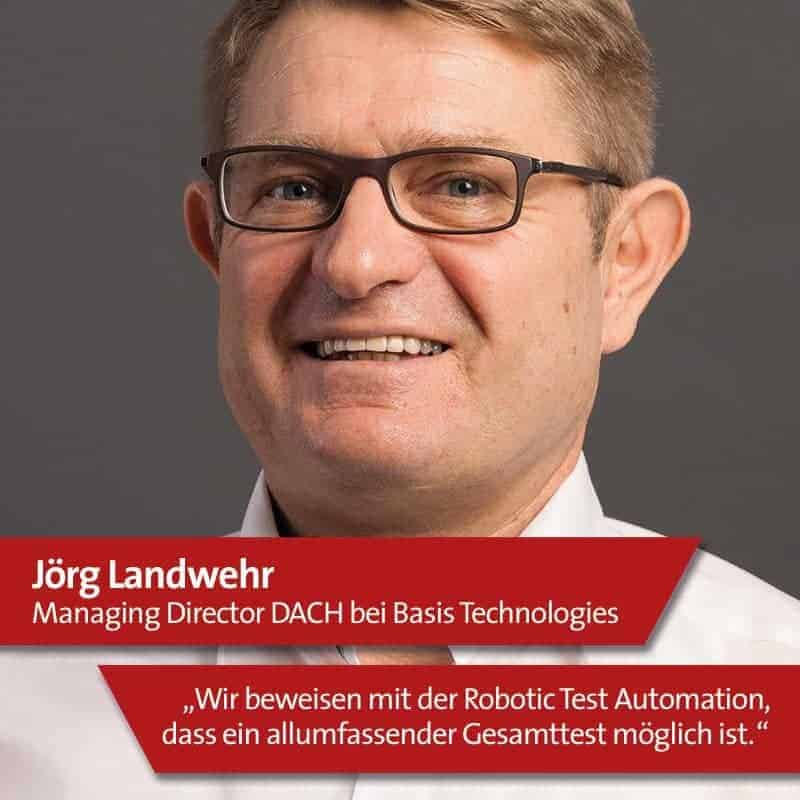SAP Test Turbo


Test management is an important topic for many SAP users. Why actually and where are the challenges?
Jörg Landwehr: SAP system tests have always been important for business operations, but nowadays they are much more in focus. The reasons for this lie in the pressure to innovate and compete - people want to work more efficiently and reduce costs.
Added to this is the steadily progressing fragmentation of the SAP "core landscape" with its increasing number of external interfaces and conversions to the cloud or to S/4 Hana.
All this complicates risk management, with many tests still having to be performed manually. Regression testing is becoming much more important as changes need to be delivered faster and more often.
So at Basis Technologies, as experts in DevOps automation for SAP, we worked specifically to create a solution to this problem.
Machine learning and AI are currently much discussed topics. How will AI and ML change SAP regression testing in the future?
Landwehr: The future will show that this is the right approach. AI and ML show new ways, even if these terms have been heavily skeptical so far.
In SAP regression testing, the biggest challenge is deciding what to test, as it is supposedly impossible to test fully.
But we prove with Robotic Test Automation (RTA) that an all-encompassing total test is possible. This option is already available today. And as technology continues to develop, we will definitely also know how to use AI and ML to make our solutions even more powerful and efficient.
 Last year you introduced Testimony, a tool based on the principle of Robotic Test Automation. Could you describe what RTA is all about?
Last year you introduced Testimony, a tool based on the principle of Robotic Test Automation. Could you describe what RTA is all about?
Landwehr: Many of our customers and partners felt that regression testing was expensive, slow and risky. Our product team got to the bottom of this problem and looked at the issue from a completely new angle - the result is RTA.
Contrary to the common opinion that regression testing is only suitable for certain parts of an SAP system, we assumed that it is possible and feasible to test the entire system at any time. Testimony is based on this idea.
RTA creates the opportunity to automate more parts of regression testing than ever before - significantly greater test coverage at an earlier stage of development is thus guaranteed.
How does RTA differ from traditional approaches?
Landwehr: Regression testing has always been based on so-called "test scripts"; virtually every approach relies on lists of test rules that must be defined, created, and maintained.
Testimony removes this complication, completely eliminating the steps for script creation and maintenance. Instead, the actual usage of the system is analyzed; within a few hours, a regression library is automatically created.
This is then used to test the effects of a planned change. The sometimes tedious management of test data is also eliminated. A revolutionary approach has thus been created that is faster, more cost-effective and has far less impact on business operations.
To what extent do agile development methods such as DevOps and Robotic Test Automation complement each other?
Landwehr: Both solutions are closely linked. Traditional regression testing has not worked for short development cycles.
Companies had to choose between delivering changes delayed or reducing the scope of testing. With Testimony, this is different: you can test an entire system very quickly and no longer have to worry about the validity or maintenance of the scripts.
The solution is part of the shift-left strategy that is central to DevOps. Thanks to Testimony's system virtualization, regression testing can be performed without a fully integrated test environment, allowing errors to be detected much earlier.
The combination of Testimony and our other DevOps automation solutions such as ActiveControl provides a comprehensive platform for the continuous delivery of SAP software.
What are the advantages for existing SAP customers?
Landwehr: Robotic Test Automation is used to make changes safer, avoid delays, and conserve resources. RTA also increases coverage while reducing test-related costs and system interruptions.
Large projects are thus accelerated, the test phase is compressed and changes can be put into production on a weekly or even daily basis with far less risk.
Companies are significantly more flexible thanks to continuous testing, increase their competitiveness and achieve steady business growth.





